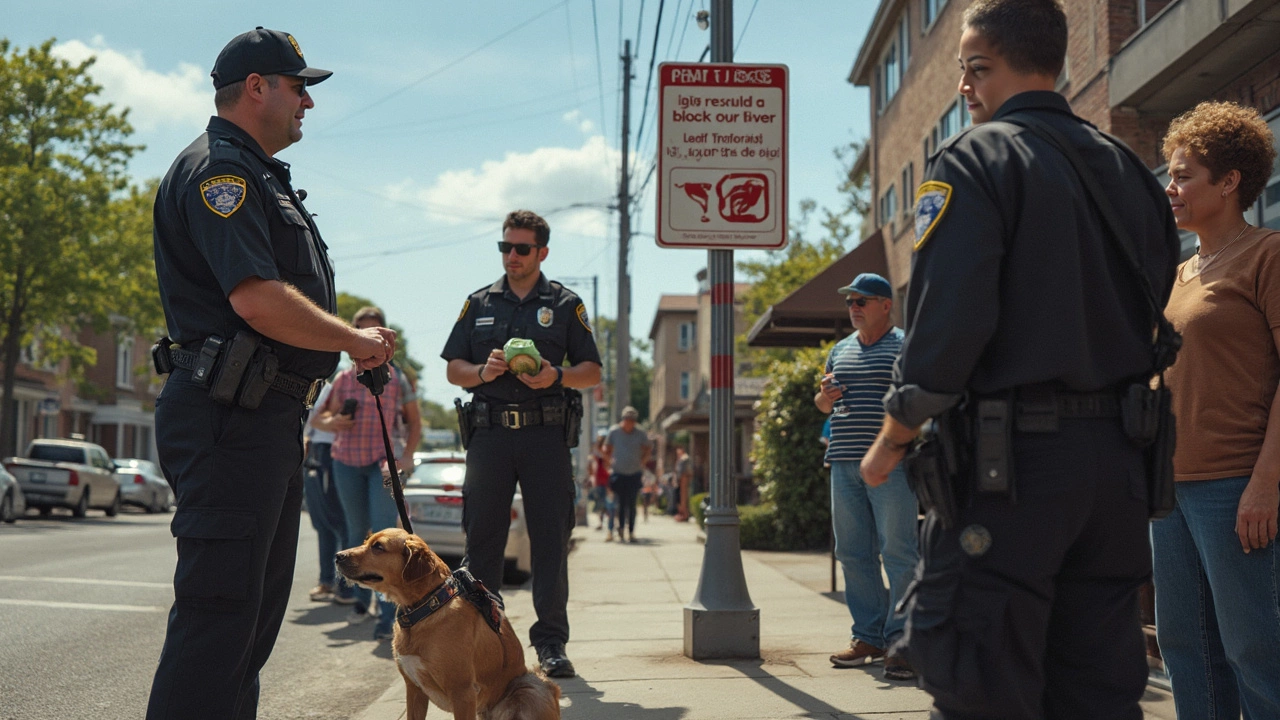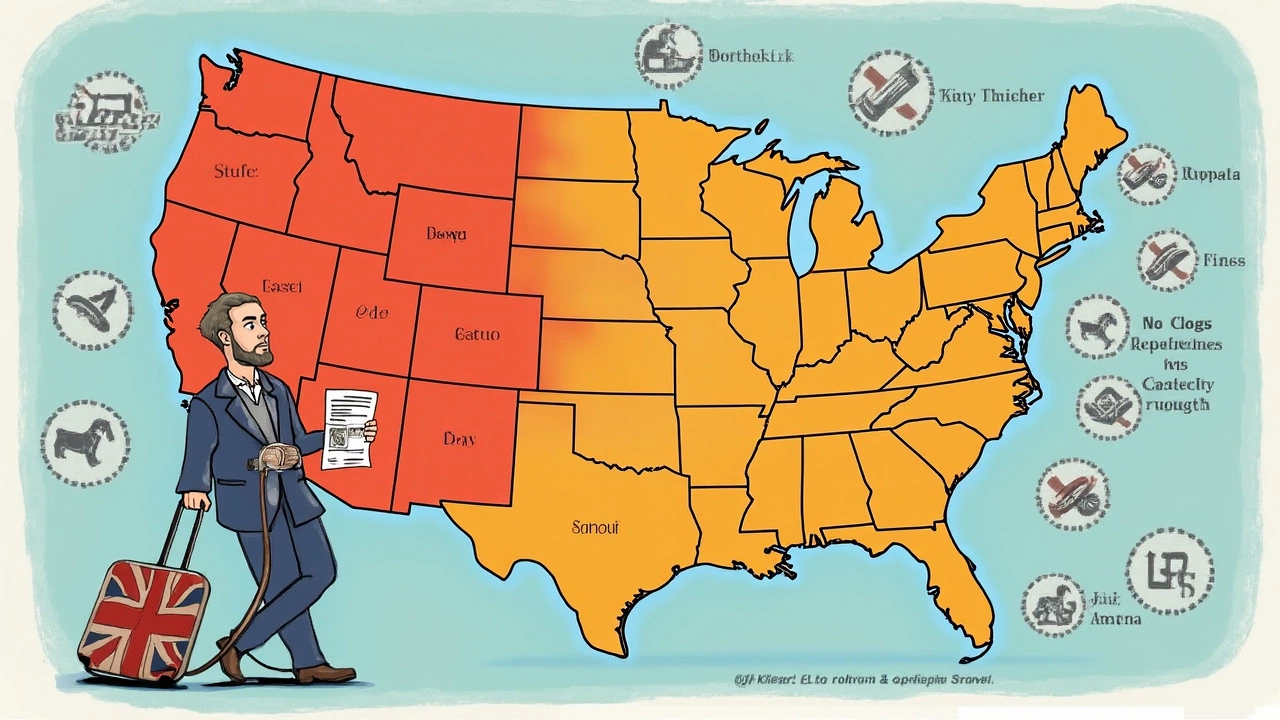Imagine you adopted a playful, goofy dog and all you want is to hang out at the park, take a cross-state road trip, or maybe visit friends across the country. But, wait. Depending on which state you call home, that simple, happy dream could get you tangled up in a web of legal trouble for things you never thought twice about. Dogs need more than just a leash and a yard—some states have created dog laws so complex, people joke you need a law degree just to let your pup pee outside. If you think all states treat pet ownership the same, get ready for a reality check.
Why State Dog Laws Vary — And Why It Matters
Every state pretty much loves dogs, but when it comes to making laws, attitudes split hard. Some states are super chill: rabies shot, basic leash, maybe a license, and you’re golden. Others act like every dog is a potential lawsuit wrapped in fur. The strictness often ties back to how rural or urban the area is, how many bite cases have happened, or just how much lawmakers trust folks to control their own pets. But here’s the weird part—there’s no nationwide rulebook. States set the basics, then cities and counties pile on their own regulations.
Quick stat-check: The American Veterinary Medical Association once reported nearly 48 million US households own a dog. That’s more households dealing with pet laws than with gun licenses or fishing permits. Owning a dog anywhere is technically a matter of public safety, neighbors’ property, and local attitudes about animals. Some states focus on preventing accidents, others are out to stop dog bites, while a handful pile on regulations to tackle everything from barking to cleaning up poop in public spaces.
If you move state-to-state? Your best dog-parent habits might suddenly land you in court. California, for example, might give you a slap on the wrist for a dog-at-large; Louisiana or Kentucky could threaten jail time. And let’s not even start on places where breed bans mean your beloved pit bull or Rottweiler is illegal, no matter how sweet it is. It’s not just rules—it’s real risks and costs for owners, plus the threat of losing your best friend.
The State with the Strictest Dog Laws: California Stands Out
Drumroll—the state that has, without much debate, the strictest, toughest, and most complex dog laws is California. Some folks might argue for Ohio or New York, but California’s web of state and county rules is a whole different breed. Let’s break it all down.
- Mandatory Spay/Neuter: Many California counties require all dogs over four months old to be spayed or neutered, unless you buy a very specific (and pricey) permit. Skip this step, and you could rack up hundreds of dollars in fines fast.
- Leash and Restraint Laws: The entire state enforces leash laws in most public spaces, but cities like Los Angeles and San Francisco have extra rules. Some ban retractable leashes entirely or set max lengths as low as 4 feet.
- Dog License Requirements: Every dog over four months must be licensed, with tags displayed at all times. Lose the tag or miss the deadline, and yes, you’ll get fined, and your pet could end up in the city shelter (with more fees to get them back).
- Dangerous Dog Statutes: In California, a single incident can get your dog on a “dangerous dog” list, shaving down your rights as an owner—even if the so-called bite never broke the skin. Some counties ban certain breeds outright and impose home inspections, locked fencing requirements, and even insurance policies that cost thousands yearly.
- Dog Tethering: Statewide, it’s illegal to tie up a dog outside for more than three hours in a 24-hour period. Animal control officers have broad authority to show up and confiscate your dog, sometimes on first warning.
- Barking Ordinances: Multiple municipal codes target "nuisance" barking. It’s not always clear what counts as too much barking, but two complaints from neighbors can trigger formal hearings and fines.
- Travel and Transferring Dogs: Every dog crossing state lines into California must have a recent (within 10 days) veterinary health certificate and proof of rabies vaccination. Airport agents actually check this, and fines can exceed $500.
And if you think you can wriggle out with a good excuse, the paperwork trail is ridiculous. Many cities require in-person applications for every annual permit, including documentation and sometimes even interviews or home inspections. If authorities label your dog “potentially dangerous,” you get a home visit, ordered fence upgrades, mandatory obedience classes, and, for repeat issues, you risk a court hearing with possible removal.
Here’s a quick peek at just a few punishments from the California Penal Code Section 398-399.5 and select city codes:
| Violation | Maximum Fine | Other Penalties |
|---|---|---|
| No license tag | $200 | Impound fees, confiscation |
| Unspayed/unneutered | $500 | Loss of permit, repeat fines |
| Leash law violation | $500 | Arrest for repeat offenses |
| Failure to control "dangerous" dog | $1000 | Misdemeanor charges, dog removed |
| Tethering too long | $250 | Immediate dog seizure |
The oddest law? In some places, it’s illegal to tie your dog up to any stationary object—even a fire hydrant outside a convenience store “for any length of time.” And secret shopper studies in Los Angeles and San Diego found that animal control officers actually do walk neighborhoods checking for violations—yes, clipboard in hand.

How Do Other States and Cities Compare?
Here’s where things get wild. Some states try to copy California, but trip up on enforcement. New York, for instance, is tough on paper—especially in NYC—but outside the big city, laws go pretty soft. Some small towns have just basic license and rabies vet forms, with only the rare animal control officer chasing down fines. But in the city? There are rules about dog runs, leashes, even how you enter elevators with a pet (dog must yield to humans, official rule!).
Ohio has a rep for breed-specific bans. Cross the wrong city line, and your pit bull or similar type could be confiscated or forced out, regardless of its temperament. Denver, in Colorado, is notorious for its (sometimes challenged) pit bull ban—even with a special permit, you face yearly home checks and severe restrictions.
Texas seems relaxed, but step into Dallas, Houston, or Austin, and you’ll meet surprisingly harsh barking and bite rules. Louisiana and Kentucky slide to the other side with breed bans, strict chain laws in some towns, and animal cruelty loopholes that are, frankly, confusing even for lawyers.
Massachusetts and Maryland are also high up for strictness—Maryland is famous for decades-long debates about pit bulls, and counties like Prince George’s kept their breed ban despite challenges. Massachusetts towns require permits for more than three dogs, and doggy daycares operate under rules rivaling medical clinics. Alaska, meanwhile, has few laws—your dog can ride shotgun in a pickup truck, no one bats an eye. But ignore leash laws in Boston or Baltimore, and you’ll get ticketed almost instantly.
Here’s a simple data drop on dog law strictness by state (score is an index from 1—lax to 5—strict):
| State | Laws Strictness Score | Breed-Specific Bans | Mandatory Spay/Neuter? |
|---|---|---|---|
| California | 5 | Plenty, varies by city | Yes (most counties) |
| Ohio | 4 | Yes | No |
| Maryland | 4 | Yes/No (depends county) | No |
| New York | 4 | Varies | No |
| Texas | 3 | Occasionally | No |
San Francisco banned unchipped dogs in public years ago. New York’s leash laws, while annoying, become minor after you see California’s. And let’s not forget, California loves paperwork—no law functions without a form (or three) and a renewal fee.
The lesson: Not all “strict” states look the same. What trips you up in Fresno is different than Albany, but don’t assume being careful about rabies shots is enough—check city, county, and state websites, or risk fines and heartbreak.
Lesser-Known Dog Laws That Catch Owners By Surprise
It’s not just the obvious stuff. So many legal landmines are hiding in plain sight your head will spin. For one, most California cities have limits on how many dogs (and sometimes which breeds) you can own in a single home—usually three, sometimes just two. Breach that limit, and city officials could force you to rehome or face daily fines. Not many owners realize this until they get reported by a noisy neighbor.
Ever hear about "pooper scooper" laws? Ignore these, and you might think nobody cares—but agencies in urban areas use hidden cameras and anonymous tips to issue tickets, especially near parks and schools. Some parks even hand out DNA kits to track down dog owners who leave a mess behind. Pet DNA registration is mandatory in certain San Diego areas, and fines? Easily over $400 if your dog's waste gets matched to you.
Transport laws keep people guessing, too. For example, in California, dogs aren’t allowed to ride in the bed of a pickup unless tethered in a special way or caged. That Instagram shot of your lab cruising highway 1 with the wind in his fur could earn a California Highway Patrol stop and a stiff ticket in seconds. But head out to the open stretches of Arizona, and no one blinks.
Lost dog? Some cities require every stray to be scanned immediately for a microchip, and shelter holds are notoriously short—just 72 hours in some places before euthanasia or adoption off. Out-of-date tags, missing microchip info, or incomplete forms slow the return, and every day adds more fines. Urban shelters like those in LA or SF run barely above capacity, and a dog’s fate is suddenly out of your hands.
If you travel with your dog, know this: California will check your dog at random highway stops for current vaccination and license, especially during disease outbreaks. Good luck if your paperwork’s expired—agents have authority to order immediate quarantine or bar entry.
A few oddities for laughs—or maybe stress:
- Some towns “outlaw” walking dogs on certain beaches at certain hours, and lifeguards keep track.
- Local noise ordinances in wealthier neighborhoods go after any dog that barks longer than 10 total minutes per hour—yes, even inside your own home.
- Daycare and boarding rules can block you from leaving a pet unless your vaccination certificates are less than 6 months old. Big oops for anyone with out-of-date records.
- California, Massachusetts, and Florida all have anti-tethering laws, but few realize that even securing a dog on the porch for more than a few hours could count as an offense.
Bite laws deserve their own warning—if your dog nips, even in “defense,” you’re often on the hook for court-ordered training, muzzling routines in public, or forced relocation. The nightmare isn't just legal—it’s the emotional fallout if you lose the right to keep your pet after a one-time mistake. No matter where you live, take reports of "aggressive" behavior seriously and document everything. A little paranoia goes a long way.

Tips to Stay on the Right Side of Tough Dog Laws
Stressed yet? Take a breath, it’s (kind of) manageable. If you’re living or visiting in a place like California—or any strict state—start by making a checklist. First, double-check your dog’s license, vaccination records, and microchip info every year. Many cities—especially LA, San Francisco, Sacramento—let you set up reminders by email for renewals and vet deadlines. No one wants to pay a fine because they forgot a renewal notice.
Next, research your city’s rules beyond just the basics. Some counties have dog law FAQs or printable guides, but don’t trust common sense—some local rules contradict state ones, and violations usually mean you pay the higher fine, not the lower. When in doubt, call your city animal control before adopting a new dog, especially a “restricted” breed. Get clear in writing if pit bulls, bull terriers, or shepherds are allowed in your neighborhood, since crossing city lines with the wrong breed can end in heartache.
Traveling or moving? Bring copies of all your paperwork—vet visits, rabies, spay/neuter certificates, and your city tag. Store them on your phone and in your glove compartment. If you drive into a stricter state, stop at a vet along the way to update anything if you’re missing documents. Quarantines and fines for bad paperwork are real, especially after dog flu or rabies scares.
For renters, check your lease and confirm that your pet is registered with management. Guys, more and more landlords call animal control if you get caught lying about a breed or pet count, and the penalty can be instant eviction or worse—cause for losing your deposit.
Be a neighbor everyone loves. Clean up religiously after your dog, keep a bark log if you have a noisy pup, and invest in training to avoid even accidental aggression. Document everything—especially if anyone accuses your dog of a bite or other "dangerous" act. For dogs with any complaint history, muzzle training and insurance might be a smart investment—you never want to argue with animal control on the street with no proof of your dog’s good record.
One odd but vital tip: Keep a list of emergency contacts (vet, animal control, pet lawyer if you have one) on your fridge and phone. Being prepared for an emergency is way easier than scrambling while panicked. Teach your kids or roommates the rules, too—reporting is often anonymous, and mistakes can get expensive fast.
If you ever get a penalty or threatened with removal, act fast. Appeal any violations, and ask for all paperwork before you give up your pet. Call a local animal rights hotline, since staff sometimes know city loopholes that regular pet owners (and even many animal control officers) miss. Sometimes a tiny change can help you keep your dog, even after a “technical” violation.
Use resources: groups like the ASPCA, Best Friends Animal Society, and local rescue groups publish updated guides on new laws. The California Department of Food and Agriculture (CDFA) has a searchable database of city and county pet laws—bookmark it right now if you’re a California dog lover. And if you’re ever in doubt, or suddenly move, assume the laws are stricter than you think—they usually are.
It’s a wild world out there for pet parents, but if you stay sharp, do your homework, and prep for paperwork marathons, you and your pup can avoid the scariest parts of these strict dog laws. Just don’t let the leash get too long—metaphorically or literally. California (and a few other states) are watching.
